the blue collection 9: Home
(Winter 2018 / 18.10)
Home
featuring
DeMisty D. Bellinger J. P. Dancing Bear Nicholas Fairclough
David Heg Ted Mc Carthy John Ndavula
James Owens Maria Pierides Stella Pierides Jennifer Saunders
Annie Q. Syed Nicolette Wong Marjory Woodfield
***
As a way to introduce this special issue, layers of words about home:
“Perhaps home is not a place but simply an irrevocable condition.” – James Baldwin
“Even if I have a home in Paris and sometimes in New York, whenever I was saying I have to go home, it was going to my mother.” – Chantal Akerman
“The brightest memory fades faster than the dullest ink.” – Claudia Rankine
“My soul is from elsewhere, I’m sure of that, and I intend to end up there.” – Jalal-al-Din Rumi
“We were as Hansel and Gretel and we ventured out into the black forest of the world.” – Patti Smith
“There is nothing like returning to a place that remains unchanged to find the ways in which you yourself have altered.” – Nelson Mandela
“I sat back in my wooden chair as they signed the paperwork and stared down at the arm rests, studying the various layers of paint, the chips and cracks. How many hands had gripped them? I wondered. What lives were attached to those hands, what dreams were shattered, what sorrows were they trying to squeeze out of their souls?” – Jimmy Santiago Baca
“Nothing is built on stone; All is built on sand, but we must build as if the sand were stone.” – Jorge Luis Borges
“The ache for home lives in all of us. The safe place where we can go as we are and not be questioned.” – Maya Angelou
“Every day is a journey, and the journey itself is home.” – Matsuo Basho
“What you risk reveals what you value.” – Jeanette Winterson
“Language is the only homeland.” – Czesław Miłosz
“I know I walk in and out of several worlds each day.” – Joy Harjo
***
J. P. Dancing Bear
Abandoned

I love how a house looks
most lit up and alive in the falling night
when the sunset reflects
off western windows;
when you can nearly believe
in a life inside;
and how it quickly shifts
to a sad silence,
as the moonlight glooms ghosts
through each vacant room.
***
Annie Q. Syed
Invisible People
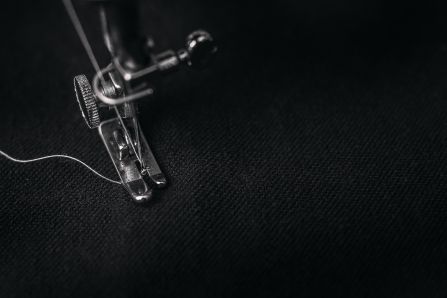
Image Credit: Alex Andrews
Noor wished she could see ghosts of people, not animals, specifically cats. One in particular, Morrissey, wouldn’t leave her side. Today was no different as she walked into her sewing shop in the busy garment district of New York that still didn’t feel familiar even though she had been given asylum here fifteen years ago. The city shape-shifted every year too.
“You are going to have to figure out a way to get on, man. This is too much.” Noor set the bag with patterns on one of her sewing tables. Morrissey jumped over the pools of cloth, pins, and scissors of varying sizes. “You know you are a ghost, right? You don’t really have to hop over anything anymore.” Noor shook her head as the cat responded with a low meow.
Morrissey wouldn’t be here if he could help it. Alone. There are others like him too, sure, but for now he is alone. And Noor understood that. She looked at her small walnut oak casket, her mother’s mirrorwork and embroidery on it, and inside ashes of her family mixed in with dust from explosives.
Noor unfolded the lightweight polyester and cotton fabric across the table. The sheath silhouette mannequin for form fitting designs stood next to the table. Changing her mind, she put aside the pencil skirt pattern and opened the fabric for making a coat. She walked over to the shoulder wedge silhouette and wrapped her arms around it so as to lift it. The heaviness of the silhouette was almost human. She placed it where the previous figure had been.
خَيّاط سَيّدات –Khayyat-e-Sayyedaat—dressmaker—mantua-maker. Creating shape where there was no shape.

The new SoHo boutique had requested the standard: notch collar, on-seam pockets, front and back seaming for shape. Noor began cutting the canvas for the coat. The wool haircloth for the chest needed soaking to soften. Outside, New York City was waking up.
***
David Heg
***
Nicolette Wong
Awaiting
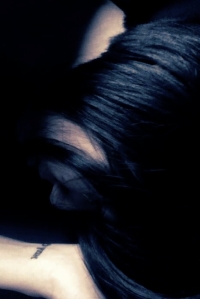
Someone has smudged my sight line
across the Western Pacific Ocean—
for years the dirt on my marble
fleeted as a faint kiss in the wind
reaching for the cliffs
at the most easterly point
of the Mainland—a call halted,
a jolt resounding forth
and back until it clotted—
a silent dive
Show me where I land
***
Stella Pierides
Haibun Triptych
Reality Bites
In my teens I spent school holidays in the local library. From opening to closing time, the library was my home. In the sizzling Athenian summers, it was the only cool place to be. The silence in the reading room felt like a blessing. Sitting at my desk I listened. A page turned. Someone shifted in their chair. Someone sighed. Silence again. I revelled in the sounds of human presence in this magic emptiness. A paradise. Except one day, when a cicada started singing. Having found its way in, it perched on Borges’s “The Book of Sand.” Heads turned. There was a commotion. A reader screamed, “Get this thing out of here!” The librarian, arm raised, raced to the shelf to swat the culprit, but the insect was no longer there.
turning the page
I come across the truth …
midsummer darkness
And yet
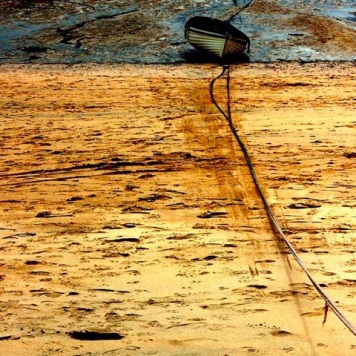
Boat by Maria Pierides
The road twists and turns for miles ahead. The refugee caravan moves haltingly forward. Mothers carrying their babies; dazed children, old people, the young, all stagger towards a safer future. Crossing the Red Sea, walking through deserts, wading across the Suchiate River, the caravan camps at Calais, rests for a night on Lesvos, repopulates the Sicilian city of Sutera, rows across river Evros. Razor wire carves memories on children’s skin. A voice over the megaphone: “Achtung, Achtung!” Babies are born, grow teeth, learn to speak. It rains, it snows, it shines. New words enter dictionaries. Poems emerge from sleeping bags.
each spring
breaking through the soil . . .
the human heart
We carry on

Stella Pierides
We turn out the lights, fall asleep and emerge head first into the real world. Belief, disbelief, nuance, knowledge; science, art, even poetry we leave behind. We
enter this eternal world without walls, where we have control over nothing, yet we are nothing less than the seed of the cosmos. Here is our true home: fluid, quiet, boundless.
In the morning, once the alarm clock’s trill drags us back into consciousness, we dress in soft flesh, teeth and nails, and catch the bus to work.
oak leaves …
planning to live past
one hundred
***
Ted Mc Carthy
Vespers
When the light began to turn green
I knew that night was coming. – Camus, L’Etranger
The room gives, as they say,
onto a square of sky. And in such stillness
as is needed to entice
a bird into the hand,
the edge of that unmoving blue
gives onto all movement,
the vastness of what is never caught,
the painting that exists beyond the frame.
Noises are gone now. Whatever life
the street had, is dispersed, taken indoors
and is suddenly felt more keenly
here where everything is seeping
in and out of walls
like food or tiredness ghosting
through muscle and brain, or colours
washing through the fading mind.
The green of evening is the eye tricking
into truth; dizzy from too long looking
at a fixed point, it cleanses the twilight
of its beauty and thousand tales
and the night is merely itself,
like the tides, nothing more than a motion,
a tiny stirring in the universe
as a bee shakes before settling to sleep.
Each sound has a purity,
muffled, unattached. That dog in the distance
is whole as the stars once were
under which he barks; the sea
underpinning. Room and sky
are one finally, the hour turning
with the unseen certain motion
of a drifting boat.
***
John Ndavula
First Winter
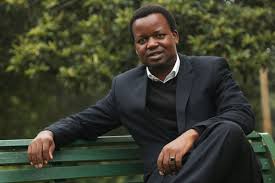 I peer outside my window and see tarmac crisscrossing blocks of white cottages. I hear a squeak and turn in time to see a squirrel going up a tree. I take my phone out. Click. Click. Click. I’m going to send the photo to my wife so that she can show the children my first impressions of America. I remember Pendo’s brown face plastered on the glass barrier at the airport, with a beanie in her hand. They wouldn’t allow her to give it to me after I crossed the barrier at the international departures in Nairobi.
I peer outside my window and see tarmac crisscrossing blocks of white cottages. I hear a squeak and turn in time to see a squirrel going up a tree. I take my phone out. Click. Click. Click. I’m going to send the photo to my wife so that she can show the children my first impressions of America. I remember Pendo’s brown face plastered on the glass barrier at the airport, with a beanie in her hand. They wouldn’t allow her to give it to me after I crossed the barrier at the international departures in Nairobi.
“Show Pendo the squirrel,” I text. “Tell her not to worry about the beanie. It is not winter yet.”
In the weeks that follow, I discover more squirrels on Campus Street where I live as an exchange professor. I see the powerful fattened mice on the Farell and on Benthart Commons. It seems these place names demarcate squirrel territory. Back home, few roads at my campus bear names. On my way to the Preus Library, squirrels dart across my path nearly toppling me over. Some scratch the bark of oaks that arch over the path. Some are graceful and float in the wind. Some assemble at Olson Lab where cadavers are kept and on the manicured lawns of Campus House where my office is. Campus House is a lonely brick affair with tiny windows and creaky stairs: it is haunted.
I’m surprised to see squirrels on the streets when I take a ride to town. They do not scamper when cars and horse-drawn wagons pass. It is a slow America: squirrels play in the park, around the stores, and eateries. They are present at the Green Vale Church where the young men and women are not. They climb tall ashen trees at the church and the branches break off on their own accord. The trees remind me of pictures on Christmas cards sold back home. The russet leaves very much unlike ours – the fall off trees and are swept by the wind into heaps. Squirrels search for nuts where leaves are falling.
On our way to lunch with colleagues from the English Department, I see a fluffy tail bobbing up and down our path. Thomas says that squirrels are vermin which needed to be exterminated. Allen says that there are things far more dangerous in America. Sandra says she once saw a squirrel plunge from up a high tree but not to its death.
“What if the falling squirrel hit your head?” Thomas asks.
Sandra shivers, then squeals.
As we sit down at the cafeteria, there is breaking news on CNN of another unarmed black male shot by police. A cold rush sweeps through my body when I remember how Thomas had earlier burst into Campus House, then backed off and screamed when he saw me at the staff lounge. Later, he apologized profusely. I look at him but he avoids eye contact. He strengthens his grip on his knife and keeps on about squirrels.
“Quite a nuisance,” Thomas says. “Messed up my garden at my new property. I wish there was a license to shoot them down,” he adds as he digs his knife into the burger.
I wake up the following morning feeling cold and clammy. I miss home. I receive a call from the campus technician who was supposed to fix my printer. I tell her it has been three weeks and two days. She apologizes for the slight delay and asks that we meet at her office. When I get outside the house, I see the grounds are white and gorgeous. It is the moment I had been waiting for. I dig into the snow with my bare hands and it crumbles; its beauty hollow. The air is cold and dense; more punishing than that in the woods back at home in July at dawn. Hints of snow on tree branches make me think of a White Christmas I’m no longer looking forward to.
I find the technician in her office. She doesn’t object to my holding her umbrella for us as we walk to Campus House in the drizzle. I listen to the sounds of her boots on the unswept tarmac as we cross the Benthart Commons. She troubleshoots the printer and finds it isn’t networked. She calls the network team to fix it. As we wait, she takes to her phone and I take to mine.
“Look, I just downloaded Snapchat,” she says showing me her avatar. She adds to it glasses, a mustache, and a pistachio hat.
She takes a selfie of us and shows me the photo. Black and white. She adds a carrot nose to my image, then a squirrel face.
“This is so exciting. Isn’t it?” she says.
I feel a lump in my throat and look away to the window. The drizzle has stopped.
“Is this your first winter?” she asks.
“Yes,” I say.
“Do you have winter boots?” she asks.
“No, but I have warm clothes,” I say.
“Those clothes you came with won’t do you any good.”
“If I get stranded, I will call you.”
“I will ask you to buy a shovel.”
The machine beeps. I turn and see paper printing.
I listen to her boots plod down the creaky stairway. I hear the click of the front door as it shuts loneliness within. I look through the window and see her walking across the whiteness of the Benthart Commons. The tree outside my window shakes in the wind. The last leaf flies to my window, then slides down out of sight. Below, the squirrels hasten to hide the last nuts.
***
James Owens
The Ugly Flower: a Science Fiction Story
ein ins Stumme entglittenes Ich
– Paul Celan, “Heimkehr”
In this myth from the ancient world, there was a home
with many houses in it, some shaded by leaves
in summer, then warm with the pleasures of going to bed
in winter. Others were different. We nomads of the stars
were small then, implied in the cells of the ancients.
(Let the voice that says the poem say “I was there.”)
One heard whales breaching off the coast,
and insects busy in the sexual chambers of plants.
There were islands and ferns, museums and mitochondria,
hard to choose the right details when all are right,

and because many important things had no names,
and, even so, the named types were beyond count,
rather than the 257 that exist now.
When the clutter and pulse were dying,
burning, buried under made things, veins clotted,
no more whales ever, the ancients gathered
for what they called “the great leap,” out into
the maybe-nothing, the maybe-somewhere,
snug in their flung cradles
that rocked them into the new
– but the voice that says “I” in the poem,
I pause at the gate and look out into the vast, prosperous shine.
I smile with a sadness that seems remembered, or a memory
that seems a sorrow, and turn back. I walk long in the soot,
until I find a wildflower of a kind never known before,
a grey, misshapen bloom, clinging to the ground. I sit beside
my sister flower and croon our names and wait for the fire.
***
DeMisty D. Bellinger
Reluctant Respectability Politics
On the streets
of Boulogne-Billancourt
void of tourists
full of les français
going to work
to play
to home
I realized
I’ve been playing
at being.
Grinning in spite
of myself
a life of accommodation
minstrelsy in a smile
it took hundreds of
French folk (vont au travail
au jouer
au maison)
not smiling back
at me
and the French
au metro
not smiling back
not clutching purses
not moving a
little further away
for me to learn
the fool I played.
***
Nicholas Fairclough
Unhomed Angels

40 Pukatea St being demoed
In August, my dad sent me and my three brothers an email. The subject: End of An Era. The body: FYI – Start of demolition of 40 Pukatea. Garage is being retained. That’s all. Word for word. Copy and pasted. As is. There’s no greeting, nor send off. Attached, a photo of our family home. On the street, parked alongside the house, is an ominous black truck, its bonnet shines like a coin in the midday winter sun. Uprooted tree branches stick out of its trailer like a skeleton climbing out of its grave. On the front, right below the windscreen, the words, in bold, white capitals ‘DEMOLITION’ reads as obvious as a children’s picture book. Mocking the whole situation, as if it needed to be s-p-e-l-t out. Shadows from the pohutukawa, cast across the street, darken the foreground. A digger, perched where the gate used to be as though it’s the gatekeeper, is the centrepiece lit by the bright, undiluted light. The house, sitting in the background like a small castle – enigmatic and unreachable – is largely hidden by the fence. The digger, the truck, and a set of fluorescent orange road cones stand guard. The backdrop – fluffy, white clouds against a bright blue sky – makes me realise this is one big joke: the weather’s reassuring me that Nobody cares.
Jesus that’s sad – the opening of the first reply-to-all response – sets off a chain reaction of replies. It binds us, brings us closer together: a comradery of sufferers! But the realisation that we’re now left to deal with this on our own, in our own way, is left unwritten. Our childhood home. A happy childhood at that! About to be reduced to rubble; they had already started on the surroundings – our vines, fig trees … I looked at the digital photo like it was my last chance to see the house before its death. A virtual reality as unnatural and impersonal as a hospital. What should I ask? … what would I want to know? Before it’s simply gone. Carrying with it its secrets.
Dad replies to the series of emails: Not sure if you want to see a progress photo or not – if you do then let me know.
I read this email in Poland, at my mother-in-law’s home. I’m here with my wife (it’s the house in which she grew up) and our two boys aged eight and four. What are we doing here? My father-in-law got sick and passed away … I had a nervous breakdown and resigned from my job … My wife was dealing with a lot of stress at work … My parents’ recent divorce … two young kids, little support … It was all too much. We were struggling.
Since my wife found it especially difficult to be so far away from (do I use the word?) home, we sold our house, most of our possessions and, with a few suitcases in tow, got on an aeroplane.
How many homes do we have, Daddy?
– None.
Is this our home, Daddy?
– No. It’s Babcia’s.
Are we staying in another home again?
– Yes. This is your cousin’s house.
Daddy, how long are we going to stay in this home?
– A few nights.
Then are we going back to Babcia’s house?
– Yes.
Is Babcia’s house our home now?
– I guess at the moment it is.
How are long are we going to stay at Babcia’s house?
– I don’t know, my unhomed angels, I really don’t know.
We have visited my late father-in-law a lot this year. We’ve lit candles for him. We’ve brought him flowers. We’ve cleaned leaves and wax from his grave.
Nothing like this happens back (will I use the word?) where I come from.
What are you going to do with my body if I die?
– I didn’t expect that question.
I’ve been thinking about it a lot.
– Silence.
I’m just letting you know it’s completely up to you. You can do what you want with me. I really have no preference … no wishes.
Remember when we used to say ‘It doesn’t matter where in the world we are, as long as we’re together’?
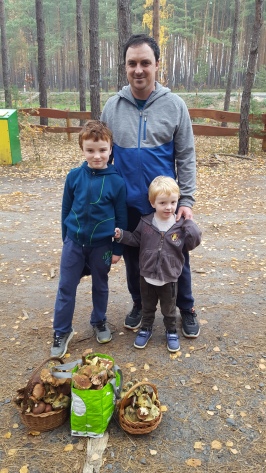
Nicholas Fairclough with sons Dominik & Feliks – picking mushrooms in the local forest down the road, Poland
What do you do in the situation when you never seem to fit in? But you really want to. Like the table’s full of food, but you’re not invited to eat. The wine is flowing, but you’re not offered a glass. When clichés like ‘There’s no place like home’ and ‘Home sweet home’ are so unfamiliar, so hard to comprehend. Even the word ‘home’ seems to be lost from your vocabulary. Is it tangible? A roof over one’s head. Is it spiritual? Is it to belong? Where it all began? Where it ends? Or is it the here and now? Is it changeable?
FW: Big changes is the subject of the next email from my dad. Oddly, it’s only sent to two of the four brothers. I guess the other two either asked not to see any progress or didn’t respond at all. It’s a forwarded email from an old neighbour, a guy my age. The email body reads: FYI (line break) Roger. And below, the original email: Big changes in Pukatea St. The photo is of the same scene from a different angle – straight in front of the property. Wispy clouds are suspended in a serious sky. The neighbour’s cabbage tree, and a big rata, on the left and the A-frame of the two-storey house on the right. The middle is missing: our house is gone. The digger’s still there, in a similar position, but without the direct sunlight on it it’s totally dull. A pile of rubble sprawls down from it onto the street. A Central Demolition ute is parked on an angle across the sloped driveway in front of the retained garage and, in the foreground, road cones are slopped on the street like dribble from a child’s mouth.
***
Jennifer Saunders
Lost in the Pages of My Langenscheidt
Pocket dictionary, patron saint
of expats, of immigrants and
emigrants, what’s in a name?
We are all far from the land
of our birth speaking languages
that tire our tongues and offer
only approximations. Demut,
he said, forcing me to choose
among: abjection, humbleness,
humility, lowliness, meekness.
They are not interchangeable.
Abject: penitent, humblehearted,
obsequious, submissive, base.
Possibilities fork like diagrammed
sentences. Penitent: repentant.
How have I come so far without
moving and still be no nearer
the truth? Wahrheit, Wirklichkeit,
Genauigkeit. Of course
there would be three. Which
to choose, and still no hope of
redemption, no Demut in sight.
***
Marjory Woodfield
In this photo
I sit beside the Caspian Sea. Green ruched bathing suit. Two plaits, striped ribbons. “Russia is over there,” my father says before we leave and he points. Just blue sea and a place where it meets blue sky. At Persepolis we climb stone steps to a throne room where lions battle winged bulls. Follow a procession up the grand staircase. Giraffe, camel, a chariot pulled by two horses. Gifts for kings. He shows us words above a doorway. I am Xerxes , the great King, King of Kings, King of countries, King of this great earth, far and wide. “That way, through the desert,” he says, “Alexander and his men took all the treasures of Persepolis. Everything on the backs of five thousand camels and tens of thousands of mules. Can you imagine?” I squeeze my eyes, wanting to see. There is only sand.
He has covered trestle tables with models.
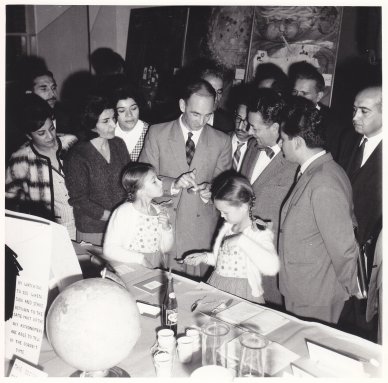 1. Earth Science. Do some substances catch fire more easily than others? He discusses this question. In his hand, a tin lid contains match heads, wood chips, sulphur, charcoal and coal. The two young children in this photo are his twin daughters.
1. Earth Science. Do some substances catch fire more easily than others? He discusses this question. In his hand, a tin lid contains match heads, wood chips, sulphur, charcoal and coal. The two young children in this photo are his twin daughters.
- How Man Measures Time. A survey, from early devices to the atomic clock. On display are sun clocks, Roman candle, water clock, nitrogen atom. All models from simple materials.
- In this Astronomy Section of the display he positions a model of the celestial sphere. The coloured liquid level in the glass represents the horizon. The plasticine ball is the earth.
After the photos have been taken, pressed into an album and presented, he writes books. Our Home in Space. Below his name, Advisor in Science, Ministry of Education, Teheran. Everything is black and white.
My mother drives us to school each morning. Distant Alborz mountains touched with snow. We learn about the War of the Roses. Look out for snakes hiding in long grass during playtimes. A bonfire for Guy Fawkes. At home I practise Captain Hook and the Pirate Band. Like best the chords at the beginning, where they walk the plank. Sforzando. My sister copies French words into an exercise book. Next door on a flat rooftop, father and son stand side by side and face Makkah. Evening prayer. At Jyoti Jewellery Market we buy turquoises the colour of the Caspian Sea. Spread
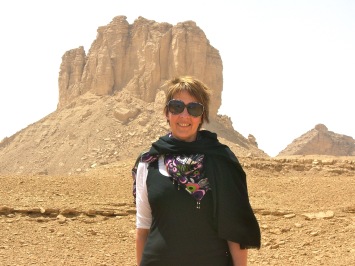
Marjory Woodfield
mattresses on the balcony of our house. Sleep as men scale high walls, take brooches, bracelets, a gold chain, once our grandmother’s. The new apartment has a pool that is long and narrow. In the earthquake, water splashes over the end like waves in the sea. My mother takes her bath each evening with the light off, longs for home. Every morning she lowers a cane basket down to the street vendor, his wooden cart full of grapes. One day we tell our teacher we’re leaving. We will all need big handkerchiefs, she says. Back home, we run down the road to our new school. Read about Māui fishing up New Zealand with his grandmother’s jawbone.
***
DeMISTY D. BELLINGER teaches creative writing at Fitchburg State University in Massachusetts. Her fiction and poetry have appeared in many places, including WhiskeyPaper, Forklift, Necessary Fiction, and The Rumpus. She lives in Massachusetts with her husband and twin daughters. She is the author Rubbing Elbows (Finishing Line Press).
J. P. DANCING BEAR is co-editor for Verse Daily and Dream Horse Press. He is the author of fourteen collections of poetry, most recently, Cephalopodic (Glass Lyre Press, 2015). His next book, Fish Singing Foxes, will be released early in 2019 by Salmon Poetry, and his book, Of Oracles and Monsters, will be released by Glass Lyre Press also in 2019. His work has appeared or will shortly in American Literary Review, Crazyhorse, the DIAGRAM, and elsewhere.
NICHOLAS FAIRCLOUGH is a New Zealander currently living in Obra, Poland with his wife and two boys. His short works have appeared in print and digital publications in NZ, Ireland, England, The Netherlands and America. He recently self-published a collection of his short fiction, The Tidal Island and Other Stories. Find out more on his website.
DAVID HEG is a photographer and educator currently manifesting in the wooded hills of eastern Connecticut. His work has appeared on the cover of Nicolette Wong’s poetry chapbook, Stone Bride Madrigals, and the online zines, Negative Suck, Dark Chaos, A-Minor Magazine, Revolution John, Otoliths, and Posit.
TED Mc CARTHY is a poet and translator living in Clones, Ireland. His work has appeared in magazines in Ireland, the UK, Germany, the USA, Canada and Australia. He has had two collections published, November Wedding, and Beverly Downs. His work may be found here.
JOHN NDAVULA’s short story, “Chicken Run,” appeared in Kikwetu Journal. His latest book is Social Media and Political Campaigns in Kenya. He has also recently published literary criticism books on fiction from East Africa and Europe. He teaches at St. Paul’s University in Kenya.
JAMES OWENS’ most recent collection of poems is Mortalia (FutureCycle Press, 2015). His poems, stories, and translations appear widely in literary journals, including recent or upcoming publications in Waxwing, Adirondack Review, The American Journal of Poetry, The Honest Ulsterman, and Southword. He lives in a small town in northern Ontario.
MARIA PIERIDES (www.mariapierides.co.uk) is an artist living in South Wales, UK. She is a member of Free Painters and Sculptors, London and King Street Gallery, Carmarthen, Wales. Maria has work exhibited at the Museum of Modern Art, Machynlleth, La Galleria, Pall Mall, London, Creek Creative, Faversham, The Other Art Fair, Bristol, Parallax Art Fair, Chelsea amongst many other places. She has work represented by several galleries across the UK and by Saatchi art online. Her work is held in collections in the UK, Austria, Belgium and Germany.
STELLA PIERIDES (www.stellapierides.com) is the author of the full-length collections Of This World (Red Moon Press, 2017) and In the Garden of Absence (Fruit Dove Press, 2012), both of which received Merit Awards by the Haiku Society of America; Ekphrasis (Fruit Dove Press, 2018); and Feeding the Doves (Fruit Dove Press, 2013), among others. Her work has appeared in Blithe Spirit, Bones, Chrysanthemum, Coast, Contemporary Haibun Online, Frogpond, Haibun Today, KYSO Flash, Modern Haiku, Presence, Right Hand Pointing, and elsewhere. She serves on The Haiku Foundation (www.thehaikufoundation.org) board of directors.
JENNIFER SAUNDERS is a poet living in German-speaking Switzerland. Her chapbook Self-Portrait with Housewife was selected by Gail Wronsky as the winner of the 2017 Clockwise Chapbook Competition and is forthcoming from Tebot Bach Press. Her work appears or is forthcoming in The Georgia Review, Glass, Spillway, The Shallow Ends, Whale Road Review, and elsewhere. Jennifer holds an MFA from Pacific University and, in the winters, she teaches skating in a hockey school.
ANNIE Q. SYED is a reader and writer who teaches full time to inspire students to read and write. Her stories,Collection of Auguries, were published in 2013. Her work has appeared in Burning House Press, Tahoma Literary Review, Ellipses Zine, The Bangor Literary Journal, Afreada, and in Reflex Fiction anthology. You can find more of her writings and thoughts at www.anniesyed.com
NICOLETTE WONG is the editor in chief of A-Minor Magazine & Press. Her poetry has appeared in Posit, Bellingham Review, Crab Orchard Review, and other venues. Visit her here.
MARJORY WOODFIELD is a New Zealand teacher and writer who has lived in the Middle East. She’s been published in a range of literary journals, including the BBC, Takahē, Star 82, Flash Frontier, Cargo Literary, Raven Chronicles, and Frogmore Press. She is a Bath Ad Hoc Fiction winner and was long listed for the Alpine Fellowship (Venice).
Comment on the blue collection 9: Home.

